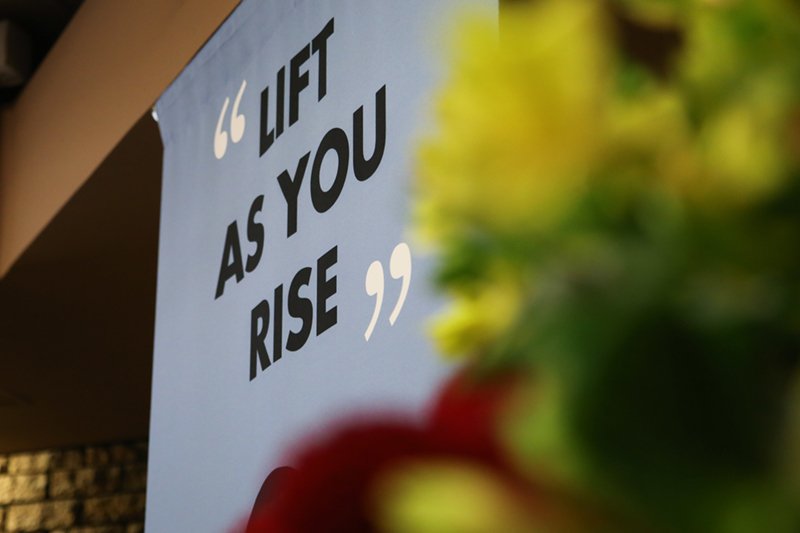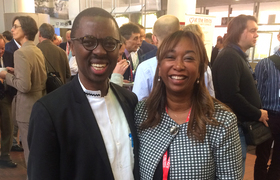Celebrating the legacy of an extraordinary son of the African soil
28 January 2022 | Story Niémah Davids. Photo Je’nine May. Read time 10 min.
“Professor Bongani Mayosi’s legacy is one of research excellence and academic development, along with the transforming effect he had on individuals’ lives, institutions and countries in Africa. Not to mention his infectious smile which could light up a room, light up your mind and light up your heart.”
These were some of the powerful sentiments shared by the World Health Organization’s (WHO) Dr Matshidiso Moeti, as she paid tribute to Professor Mayosi – the late dean of the University of Cape Town’s (UCT) Faculty of Health Sciences (FHS).
Dr Moeti, who currently serves as the WHO’s regional director for Africa, delivered the third annual Bongani Mayosi Memorial Lecture on Thursday, 27 January. Her talk was titled: “Lessons from Bongani Mayosi’s life and work: Transformation in the era of COVID-19”. The virtual event was held in partnership with the Bongani Mayosi Foundation – a day before what would’ve been his 55th birthday.
The public lecture was hosted by the FHS and included two tribute videos, one of which highlighted the work of the foundation, as well as a praise song in honour of an extraordinary son of the African soil. The event aims to celebrate Mayosi’s immeasurable legacy and his indelible contribution to African scholarship and research excellence in South Africa, the African continent and globally.
Close ally
From 2012 until his passing in 2018, Mayosi was the Chair of the WHO’s African Advisory Committee on Health Research and Development – a multi-disciplinary, multi-sectoral body appointed to provide advice on research related to health policies and development strategies. Moeti said he helped to resuscitate and re-energise the committee, which under his leadership developed a research strategy for the WHO in Africa.
As the continent and the world continue to grapple with the effects of the COVID-19 pandemic for the second consecutive year, Moeti said she can’t help but wonder how Mayosi would’ve contributed to managing the pandemic in South Africa and on the continent.
“In response to the COVID-19 pandemic, our continent and the world [have] been poorer without the commitment, skills and razor-sharp insights of this outstanding clinician.”
“What I can say with certainty is that Professor Mayosi would be using his scientific intuition, and insight, along with his position as a top cardiologist and one of the world’s premier medical researchers for the [greater] good of South Africa, Africa and the world at this difficult time,” she said.
“In response to the COVID-19 pandemic, our continent and the world [have] been poorer without the commitment, skills and the razor-sharp insights of this outstanding clinician.”
As one of the WHO’s most powerful allies, she said there’s no doubt in her mind that he would’ve been at the forefront of the organisation’s fight for equitable access to COVID-19 vaccines, tools and other commodities.
Legendary work ethic
As a professor of cardiology, Moeti told the audience that Mayosi’s work ethic was unfaltering.
He dedicated his research to answering prevailing and fundamental questions on cardiovascular health in Africans – a medical discipline which still does not receive the attention it deserves, and the COVID-19 pandemic has contributed to this. Ironically, she pointed out that cardiovascular disease is a “key area of vulnerability” for severe illness and death as a result of COVD-19. In fact, one study published by the European Society of Cardiology in 2021 identified cardiovascular complications in as many as one in four patients hospitalised with SARS-CoV-2.
“He built research capacity across the continent undeterred if countries had no existing research management infrastructure or ethics committees.”
Moeti said Mayosi knew “all too well” that inequalities in healthcare were a reality long before the onset of the COVID-19 pandemic. Sadly, she said, cardiac disease, along with other non-communicable diseases have received minimal research investment from governments over the years. Yet according to a recent WHO report published at the end of 2021, several million deaths can be prevented by 2030 if low- and lower-middle income countries made an additional investment of less than one dollar per person per year to prevent and treat non-communicable diseases like heart disease, diabetes and cancer. These diseases are currently responsible for seven out of every 10 deaths globally.
And the COVID-19 pandemic has deepened this crisis. Today, [affluent countries] enter into local manufacturing and production trade-offs with African countries that are struggling to access diagnostics, personal protective equipment (PPE), oxygen and vaccines.
“We have much to learn from Professor Mayosi’s example in his quest for answers. He built research capacity across the continent undeterred if countries had no existing research management infrastructure or ethics committees,” she said.
“His concerns, interests and the work he was doing were important in the past, but his persistence and commitment to being the change is even more relevant now as we look forward to further transforming public health within and post COVID-19.”
Accelerate vaccine uptake
Two years after the onset of the pandemic, Moeti said the WHO is committed to supporting countries to make “an urgent paradigm shift” towards promoting health and well-being and preventing diseases by addressing the root cause.
And harnessing the power of science, research innovation, data and physical technologies is crucial to benefit health and disease promotion for early diagnosis and case management; and to boost the prevention, early detection and rapid response to epidemics and pandemics. In the context of COVID-19, prioritising vaccine uptake to reach the necessary global targets, which necessitate that 70% of citizens of all countries be vaccinated against COVID-19 by June 2022, is critical. Despite this target, more than 80% of Africans have not yet received a single vaccine dose.
“Professor Mayosi’s unfaltering belief in Africa’s people, institutions and potential, and his pursuit of beneficial international partnerships and collaborations is a reminder to all of us of what is possible.”
“Vaccines alone, of course, are not the golden ticket. But they offer the most likely path out of this pandemic and I am certain that Bongani would’ve approved of all these efforts. We cannot afford to gamble [with] a virus whose evolution we cannot control nor predict,” she said.
The campaign, she explained, is also driven by health and economic imperatives and aims to stop the pandemic as rapidly as possible. It’s further supported by technical analysis on disease epidemiology, vaccine attributes and a feasibility assessment.
“If it all seems daunting, Professor Mayosi’s unfaltering belief in Africa’s people, institutions and potential, and his pursuit of beneficial international partnerships and collaborations is a reminder to all of us of what is possible,” Moeti said.
‘Grow your own timber’
Moeti said the WHO’s stance aligns firmly with Mayosi’s “grow your own timber” philosophy. This unique standpoint emphasises excellence while nurturing and mentoring people with potential, in order to create a pipeline of African scientists and researchers.
“It is critical that we follow his example to optimise the capacity of all people [and] afford opportunities for all to fulfil their true potential. He lived by this principle – training researchers, enabling people to conduct research, using that research and making purposeful connections,” she said.
“I remain hugely inspired by his work, his advice and by his energy.”
Mayosi’s work and legacy serve as a constant reminder of issues of equity and re-emphasises the need to work collaboratively using the evidence of science to inform clinicians’ work.
“His approaches are clearly relevant to what is needed in the pandemic and going beyond. Even though he may not be with us physically, his lessons are still very much applicable and resonate in our minds every day as we do our work. They are alive in everything that you are doing in South Africa, and what we [the WHO] are promoting among our colleagues and member states,” Moeti said.
“I remain hugely inspired by his work, his advice and by his energy.”
A champion of transformation
Delivering closing remarks, UCT Vice-Chancellor Professor Mamokgethi Phakeng said the passing of Mayosi, the well-loved and respected dean of the FHS, was tragic, and the pain that many within the campus community and globally felt at the time of his death, remains today.
But Professor Phakeng said his lasting contribution to the field of cardiology and to the academy in general, as well as his passing, compelled “much institutional introspection”. Perhaps, she said, some would even say “much-needed institutional introspection”. But it came at too high a cost.
“We continue to learn from his life and the circumstances of his death. Professor Mayosi was a champion of transformation … he strongly believed in the potential of Africa and its people. He believed that Africa can. He was an outstanding human being who gave his utmost to help others,” she said.
“We [the UCT community] feel his absence deeply; we are weaker without him. Our story of transformation will never be what it could have been with him.”
 This work is licensed under a Creative Commons Attribution-NoDerivatives 4.0 International License.
This work is licensed under a Creative Commons Attribution-NoDerivatives 4.0 International License.
Please view the republishing articles page for more information.










